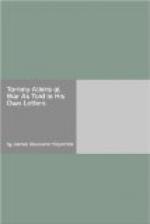Writing home is certainly done under circumstances which are apt to have a disturbing effect upon the literary style. “Excuse this scrawl,” writes one soldier, “the German shells have interrupted me six times already, and I had to dash out with my bayonet before I was able to finish it off.” Another concludes: “Well, mother, I must close now. The bullets are a bit too thick for letter-writing.” To a young engineer the experience was so strange that he describes it as “like writing in a dream.”
Some of the nick-names given by Tommy Atkins to the German shells have already been quoted, but the most amusing is surely that in a letter from Private Watters. “One of our men,” he relates, “has got a ripping cure for neuralgia, but he isn’t going to take out a patent for it! While lying in the trenches, mad with pain in the face, a shell burst beside him. He wasn’t hit, but the explosion rendered him unconscious for a time, and when he recovered, his neuralgia had gone. His name is Palmer, so now we call the German shells ‘Palmer’s Neuralgia Cure.’”
The amusing story of a long march afforded some mirth in the trenches when it got to be known. A party of artillerymen who had been toiling along in the dark for hours, and were like to drop with fatigue, ran straight into a troop of horsemen posted near a wood. “We thought they were Germans,” one gunner related, “for we couldn’t make out the colors of the uniforms or anything else, until we heard some one sing out ‘Where the hell do you think you’re going to?’ Then we knew we were with friends.”
Football is the great topic of discussion in the trenches. Mr. Harold Ashton, of the Daily News and Leader, relates an amusing encounter with a Royal Horse Artilleryman to whom he showed a copy of the paper. “Where’s the sporting news?” asked the artilleryman as he glanced over the pages. “Shot away in the war,” replied Mr. Ashton. “What!” exclaimed Tommy, “not a line about the Arsenal? Well, I’m blowed! This is a war!” “We are all in good spirits,” writes a bombardier in the 44th Battery, Royal Artillery, “and mainly anxious to know how football is going on in Newcastle now.” “I got this,” said a Gordon Highlander, referring to his wound, “because I became excited in an argument with wee Geordie Ferris, of our company, about the chances of Queen’s Park and Rangers this season.”
An artilleryman sends a description of the fighting written in the jargon of the football field. He describes the war as “the great match for the European Cup, which is being played before a record gate, though you can’t perhaps see the crowd.” In spite of all their swank, he adds, “the Germans haven’t scored a goal yet, and I wouldn’t give a brass farthing for their chances of lifting the Cup.” At the battle of Mons it was noticed that some soldiers even went into action with a football attached to their knapsacks!




